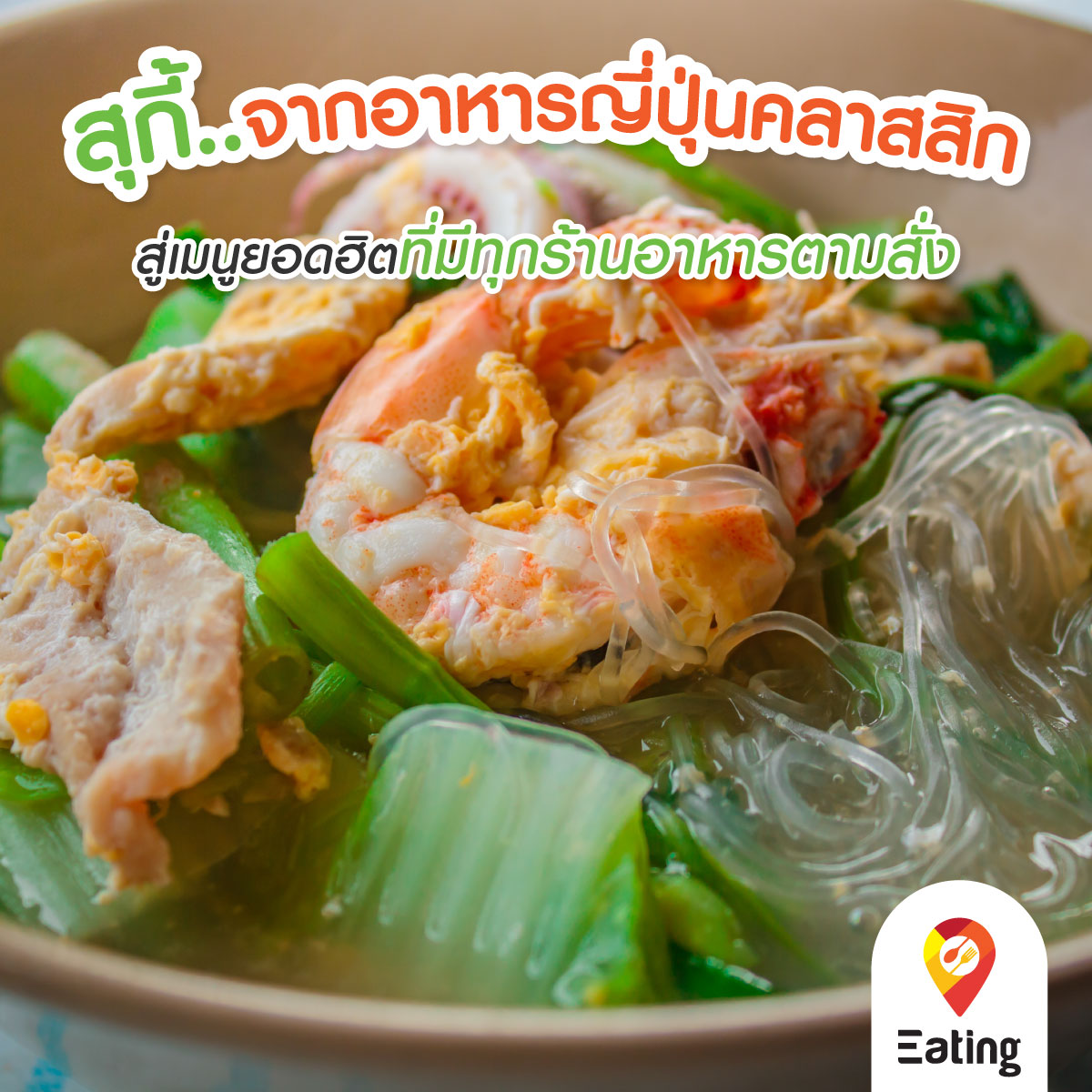Insider
New Experience

สุกี้..จากอาหารญี่ปุ่นคลาสสิก
สู่เมนูยอดฮิตที่มีทุกร้านอาหารตามสั่ง
สุกี้แห้ง หรือ สุกี้น้ำ ที่ดูว่าเป็นเรื่องธรรมดาๆ นั้น ลองคิดดูครับ จะมีอะไรเยอะแยะเหนือคำว่าธรรมดา เอาเป็นว่าทำไมถึงเรียกว่าสุกี้ แล้วเป็นมาอย่างไร ตั้งแต่เมื่อไหร่ แล้วยังมีสุกี้แบบอื่น ๆ อีกหรือไม่ ที่สำคัญ ทำไมถึงกว้างขวางขนาดร้านอาหารตามสั่ง อาหารประจำถนน ประจำซอย ทุกแห่งต้องมี
.
สุกี้ที่เรียกสั้นๆ ชื่อก็บอกโต้ง ๆ ว่าเป็นของกินของญี่ปุ่น แล้วเข้ามาเมืองไทยตั้งแต่เมื่อไหร่นั้นเป็นเรื่องเก่าแก่ ไม่รู้ต้นสายปลายเหตุ และพูดกันหลายกระแส ที่จริงคนไทยหลายคนรู้จักสุกี้มาบ้างแล้ว อาจจะเคยกินที่ญี่ปุ่น หรือร้านอาหารญี่ปุ่นในเมืองไทย
.
แต่ชื่อเสียงสุกี้ยากี้ที่ดังสนั่นเมืองไทย ส่วนหนึ่งก็มาจากที่ญี่ปุ่นมีเพลงหนึ่งดังระเบิด ร้องโดย Kyu Sakamoto เพลงนี้ดังข้ามฟากไปถึง New York ในปี 1963 คนอเมริกันไปตั้งชื่อเพลงใหม่เป็น Sukiyaki เพราะจำง่ายดี ทั้งที่เนื้อเพลงไม่ได้เกี่ยวกับเรื่องกินเลยแม้แต่น้อย ดังนานมากและดังมาถึงเมืองไทย
.
สถานีวิทยุที่มีรายการเพลงฝรั่ง ซึ่งตอนนั้นก็มี เทวัญ วนะภูติ และ เล็ก วงค์สว่าง เป็นคนจัดรายการ เป็นรายการยอดฮิต เปิดเพลง Sukiyaki จนแผ่นเสียงเกือบทะลุ คนไทยไม่เว้นวัยกลายเป็น Kyu Sakamoto กันหมด ร้องกันได้ทั้งเมือง ร้องเพลงไม่พอ ยังอยากรู้ว่าเจ้าสุกี้ยากี้นี้จะอร่อยด้วยหรือไม่
.
แต่สุกี้ที่คนไทยเราทานนั้นจะเรียกว่าสุกี้สั้นๆ ห้วนๆ บ้าง และสุกี้ที่คนไทยชอบทานถูกทำขึ้นในร้านไหหลำก่อน ก่อนที่จีนกลุ่มภาษาอื่นจะเอาไปทำบ้าง ร้านอาหารหรือภัตตาคารไหหลำทั้งหลายทั้งปวงนั้น ปกติต้องมีข้าวมันไก่ตอน มีแพะตุ๋น ขนมจีนไหหลำ แล้วต้องมีผัดจับฉ่ายไหหลำ ทั้งหมดเป็นอาหารชูโรง ส่วนประกอบจับฉ่ายไหหลำก็มีเนื้อ ปลาหมึก กุ้ง ผักกาดขาว กะหล่ำปลี ต้นหอม หอมใหญ่ ขึ้นฉ่าย เห็ดหอม เห็ดหูหนู วุ้นเส้น ฟองเต้าหู้ และเสริมด้วยการทานกับน้ำจิ้มสุกี้ที่ประเทศญี่ปุ่นไม่ได้ทานแบบเรา ทำให้ถูกปากคนไทยมากขึ้น
----------------------------------------------
DrySuki or SoupSuki, which might seem like a common dish, has much more to it than meets the eye. Let's consider why it's called suki, where it came from, how long it's been around, and if there are other types of suki. Most importantly, why has it become so widespread that every street food stall and local eatery must have it?
.
The term "suki" is short for "sukiyaki," which is obviously a Japanese dish. Its introduction to Thailand is an ancient tale with unclear origins and multiple theories. In fact, many Thais were already familiar with sukiyaki, having possibly tried it in Japan or at Japanese restaurants in Thailand.
.
However, sukiyaki gained massive popularity in Thailand partly due to a famous song from Japan. This song, sung by Kyu Sakamoto, became a huge hit and reached New York in 1963, where Americans renamed it "Sukiyaki" for simplicity, even though the lyrics had nothing to do with food. The song remained popular for a long time and reached Thailand as well.
.
Thai radio stations that played Western music, hosted by Tewan Wanaputi and Lek Wong Sawang, played "Sukiyaki" so often that the records nearly wore out. Thais of all ages became Kyu Sakamoto fans, singing along to the song. Not only did they sing the song, but they also became curious about how delicious sukiyaki might be.
.
However, the suki that Thais enjoy is often referred to simply as "suki." The Thai version of suki was originally prepared in Hainanese restaurants before being adopted by other Chinese communities. Hainanese restaurants and eateries typically feature dishes such as Hainanese chicken rice, stewed goat, Hainanese rice noodles, and Hainanese mixed vegetables (chap chai). These are all signature dishes.
.
The Hainanese mixed vegetables, or chap chai, include ingredients like meat, squid, shrimp, napa cabbage, cabbage, green onions, onions, celery, shiitake mushrooms, black fungus, glass noodles, and tofu skin. This dish is often served with suki sauce, which is quite different from how it's consumed in Japan, making it more appealing to the Thai palate.
ขอขอบคุณข้อมูลจาก สุธน สุขพิศิษฐ์